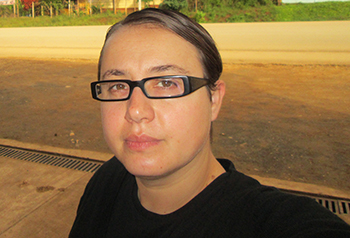
Guatemala Conference: Silvia Posocco
USC Shoah Foundation Center for Advanced Genocide Research will host the international conference “A Conflict? Genocide and Resistance in Guatemala,” at the University of Southern California, Sept. 11-14, 2016. The scholars profiled in this series were each selected to present their research at the conference.
Silvia Posocco, lecturer in the departments of Psychosocial Studies, and History and Philosophy at the University of London, will speak about the transnational movement of children from Guatemala to Europe during the 1980s at the conference.
Posocco’s background is in social anthropology and gender studies, and her work to date has focused on a theoretically inflected ethnographic approach to the study of relations and relational categories, notably 'gender', 'sexuality', 'secrecy', and 'violence'. She is committed to ethnographic research in Guatemala, where she first worked with ex-combatants of the guerrilla organization Fuerzas Armadas Rebeldes-Unidad Revolucionaria Nacional Guatemalteca (FAR-URNG). This research was published in the book Secrecy and Insurgency: Socialities and Knowledge Practices in Guatemala (Alabama University Press, 2014). Since 2009, she has researched the legacies of the Guatemalan conflict from the perspective of an ethnography of transnational adoption circuits.
She has been particularly interested in the transnational movement of children to Europe during the 1980s at the height of the counter-insurgency campaigns and in their immediate aftermath. The paper she will be presenting at the conference is titled ‘Traces, Remnants, Genocide: Transnational Adoption in Guatemala in the 1980s.’
In her proposal, Posocco explains that the paper focuses on an analysis of the traces and remnants of fifty years of progressively more intense processes and practices of child removal and transnational transplantation from Guatemala, the Latin American country with the longest and largest transnational adoption program in the 20th century.
“The paper argues that the transnational adoption circuits that operated in Guatemala from the mid-20th century should be examined specifically in relation to social, historical and political dynamics connected to the Guatemalan conflict (1960-1996) and its violent aftermath,” Posocco wrote. “More specifically, through the analysis of the case of a group of children moved from Alta Verapaz to Europe in the early 1980s, the paper seeks to examine and theorize the nexus between transnational adoption and genocide.”
Posocco added, “I look forward to participating in this important event and especially to meeting the organizers and speakers, as I have followed their work over many years.”